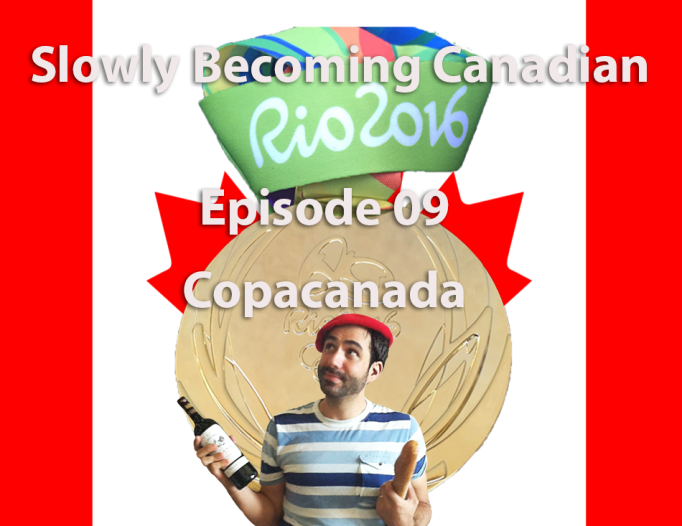France enthousiast, Grant MacNeil, stops by the podcast to bring a different perspective and chat about the time he spent in France. We talk about learning French by writing words on your arm, strikes, how peanut butter is not a thing in France, how French people don’t know anything about Vimy, and much more. Also, Grant used to be on polar bear watch (not in France, though). To learn more about that, listen to the episode on iTunes, Soundcloud or here:
France
Slowly Becoming Canadian – Episode 09 – Copacanada

Friend of the podcast, Damian Daniels, is back and this time we’re talking about the Olympics that just happened in Rio. How many hours of sports is it humanly possible to watch per day? How did Canada and France do? Is team dressage a real thing? How do you pronounce Fu Yuanhui? Can Damian do a good Ryan Lochte? Do I laugh every couple minutes? Listen to this episode and find out!
Available on iTunes:
https://itunes.apple.com/ca/podcast/slowly-becoming-canadian-episode/id1044900233?i=1000374641073&l=fr&mt=2
What you think about French people
Joyeux 14 juillet !!
FUN FACT: Bastille Day isn’t a thing. It’s just called “le 14 juillet”.
When you think about it, it’s a funny thing to do to rename another country’s national day. It’d be like calling the 4th of July “Liberty Bell Day” or Cinco de Mayo “Puebla Dia”.
I still like it when people wish me a Happy Bastille Day, though. It’s great to see some people know it’s France’s national day!
Pardon my French(ness)
Believe it or not, this is not how I dress everyday. Actually, I never dress like that and I can assure you almost nobody in France wears a béret anymore. Nor do people eat croissants every morning, or walk around in designers clothes, and shower with Chanel N°5. I know, this is very disappointing.
Some clichés about French people are true though. If you visit France for a couple weeks, chances are you will encounter a demonstration or won’t be able to take the train because people are on strike. A lot of people do have five weeks of holiday per year – but you need those day-offs to recover from all those strikes. And if you are ever in need of a lighter just ask anybody around you as one in three French people smokes. Which might explain why we tend to be grumpy.
I often refer to clichés about Canada and Canadian people when I write this blog, so to balance the scale, respond to this poll, share this post so many people do it too and let’s see what people think about people from France. I will write a description of a typical French person according to the comments. And maybe try to defend my fellow citizens a little.
Now that you are done, check if you speak Nova Scotian here
Celebrating France’s National Day in Canada
Today is July 14th, France’s National Day which you might know as Bastille Day. However if you mention Bastille Day to someone from France who has never been to North America they might take a while to understand what you are talking about. Yes, we do celebrate the taking of La Bastille but we actually just call it “le 14 juillet”. Anyway, I might be Slowly Becoming Canadian but I am still French so every year I try to make a French dinner. This year I decided to go with a typical French “aperitif”, and now I might have to re-mortgage the houes I don’t have yet.
- 1 baguette : $3.49
- 1 saucisson : $12.99
- A small piece of brie (ok, I went with a French brand but it’s not even a fancy one!) : $11.57
- A few olives : $4.50
- A very small piece of pâté (I didn’t even contemplate buying Foie Gras) : $6.99
- A bottle of wine (not the cheapest but not a Saint-Émilion either) : $15.99
Total : $59.02. Add taxes and you are above $65 for a meal that would probably cost €20 in France.
I love you Canada but you make it very expensive for me to keep my ”frenchness”.
Vive la France !
_____________________________________________________________________
Fêter le 14 juillet au Canada
Aujourd’hui, c’est le 14 juillet ou « Bastille Day » comme les nord-américains l’appellent. Chaque année j’essaye d’expliquer qu’en France personne n’appelle le 14 juillet « Jour de la Bastille » et chaque année une ou deux personnes m’expliquent que je me trompe et sont persuadées que je ne suis pas un bon français. Bref, je deviens peut-être doucement canadien mais je suis toujours français et donc je fais toujours un dîner typiquement français pour l’occasion. Cette année j’ai décidé de faire un apéro et maintenant je vais peut-être devoir hypothéquer la maison que je n’ai pas encore.
- 1 baguette : 3.49$
- 1 saucisson : 12.99$
- Un petit morceau de brie (Président, donc pas non-plus le plus cher…) : 11.57$
- Quelques olives : 4.50$
- Un très petit morceau de pâté (je n’ai même pas envisagé du foie gras) : $6.99$
- Une bouteille de vin (pas la moins cher mais pas un Saint-Émilion) : $15.99$
Total : 59.02$. On ajoute les taxes et on arrive à plus de 65$ pour un apéro qui aurait probablement coûté 20€ en France.
Canada, je t’aime mais je veux garder mon côté français et tu ne me rends pas la tâche facile.
Vive la France !
Going home
Slowly becoming Canadian means I spend a lot of time – actually all my time – in Canada. Fortunately, I get to go back home once in a while. Here are some things you should keep in mind if you are ever in this situation:
1- Make a list of all the people you want to see. Done? Now, accept the fact that you won’t get to see all of them. Unless you have plenty of money or don’t have a job, you never go home for a long enough period to see everybody. That’s just the way it is.
2- Get ready to eat and drink a lot more than usual. This is especially true if, like me, you’re going to France. France has one of the best cuisines in the world and great food combined with cheap alcohol is a recipe for a few hangovers and a few extra pounds around your waist. That’s OK though. When you’re at the gym back in Canada, losing the extra pounds, you will miss the food and the drinks, so enjoy!
3- Make sure not to refer too much to the country where you currently reside. When you visit your home country , you may find yourself wanting to compare both countries and talk constantly about your new home to your family and friends. However, remember when your friends went on a trip to a faraway country and showed you tons of pictures and told you everything about its culture? You don’t want to be that person.
4- Spend time with your family and friends. This trip is about seeing people you miss the rest of the time. You’ll have plenty of time to rest when you go back to where you live now.
5- You might get very sad when it’s time to leave. Keep in mind that it was your choice to move abroad and that you’re going back to your “new home” that you love. To cope, start planning your next trip home or figuring out a way to convince people to come visit you.
France will always be home for me. I am Slowly Becoming Canadian, but when I go home it doesn’t take me more than 30 seconds to be completely French again.
France, me voilà !
____________________________________________________________________
Devenir lentement canadien veut dire que je passe beaucoup de temps – tout mon temps en fait – au Canada. Heureusement, j’arrive à rentrer en France de temps en temps. Voici quelques conseils que vous devriez garder à l’esprit si jamais vous vous retrouvez dans la même situation :
1- Faites une liste de toutes les personnes que vous voulez voir. C’est fait ? Maintenant, faites-vous à l’idée que vous ne pourrez pas tous les voir. Sauf si vous avez beaucoup d’argent ou que vous ne travaillez pas, votre voyage n’est jamais assez long pour voir tout le monde. C’est comme ça.
2- Préparez-vous à manger et boire bien plus que d’habitude, surtout si comme moi vous aller en France. La France a une des meilleures cuisines du monde et la bonne nourriture combinée à l’alcool à bas prix est une bonne recette pour pas mal de gueules de bois et quelques kilos en plus. Mais ce n’est pas grave. Quand vous serez de retour au Canada et à la salle de sport en train de perdre les kilos pris, la bonne nourriture et le bon vin vous manqueront, alors profitez-en !
3- Assurez-vous de ne pas trop parler du pays dans lequel vous vivez. Quand vous allez en vacances dans votre pays d’origine, vous avez tendance à comparer les deux pays et à en parler constamment à vos amis et votre famille. Mais, vous vous souvenez quand vos amis sont partis en vacances dans un pays lointain, qu’ils vous ont fait regarder des tonnes de photos et vous ont tout expliqué au sujet de sa culture ? Ne soyez pas cette personne.
4- Passez du temps avec votre famille et vos amis. Vous faîtes ce voyage pour voir les gens qui vous manquent le reste du temps. Vous aurez tout le temps de vous reposer quand vous serez de retour où vous vivez maintenant.
5- Vous serez probablement très triste quand il sera temps de rentrer. Rappelez-vous que c’était votre choix de vivre à l’étranger et que vous retournez à votre « nouveau chez vous » que vous aimez. Pour vous remonter le moral, commencez à planifier votre prochain retour ou à trouver un moyen de convaincre vos amis et votre famille de vous rendre visite.
La France sera toujours mon « chez moi ». Je deviens lentement canadien, mais quand je rentre en France ça ne me prend jamais plus de 30 secondes pour redevenir complètement français.
France, me voilà !


